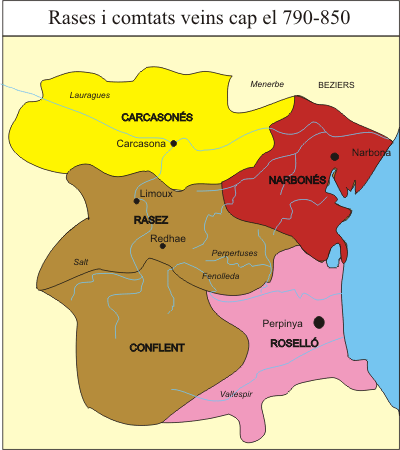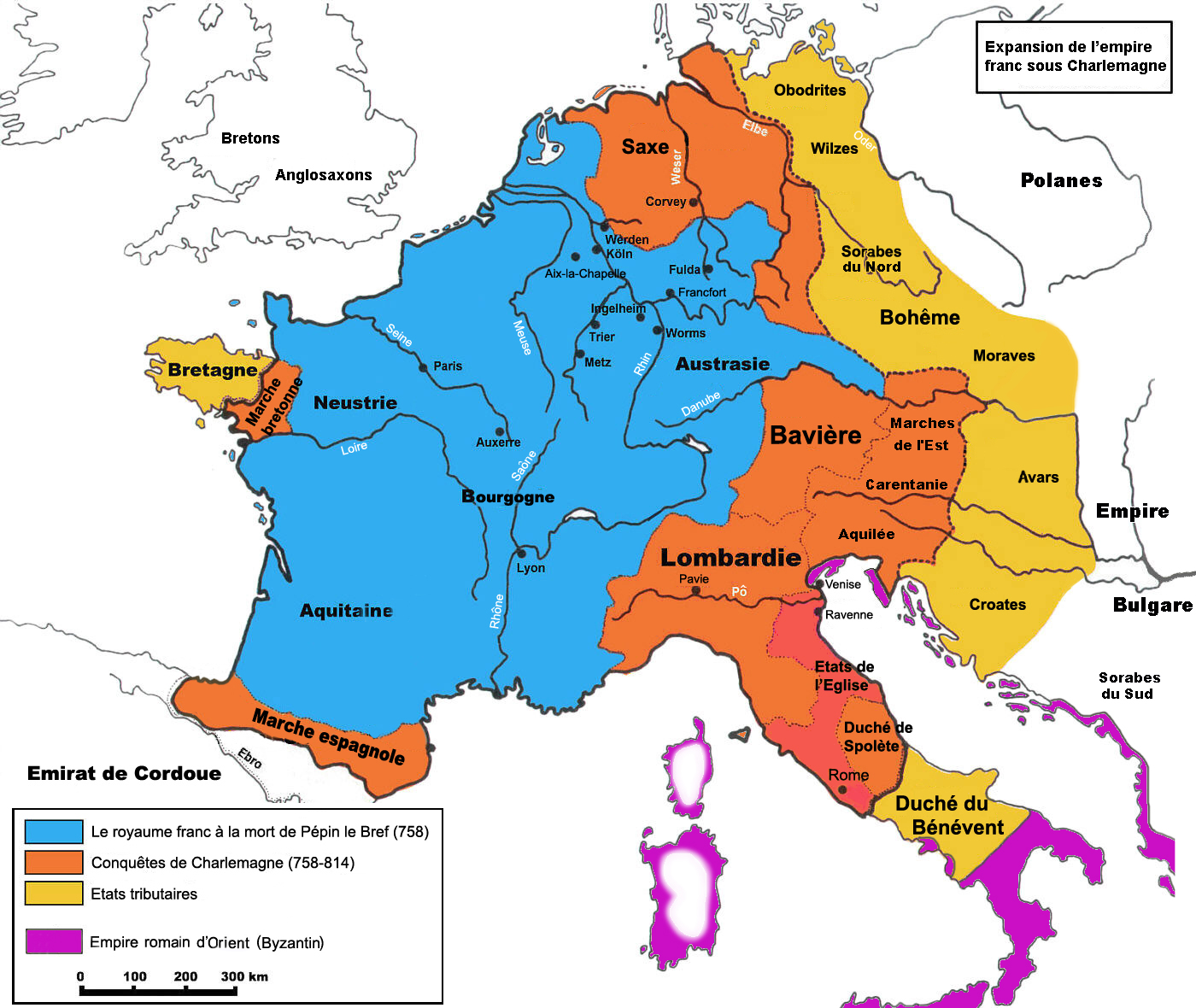|
County Of Razès
The County of Razès was a feudal jurisdiction in Occitania, south of the County of Carcassonne, in what is now Southern France. It was founded in 781, after the creation of the Kingdom of Aquitania, when Septimania was separated from that state. History The county had its seat in ''Rhedae'', a Roman and later Visigoth town conquered by the Franks in 756, together with Septimania. In 781 Charlemagne created the Kingdom of Aquitaine for his infant son Louis. About 790 he sent his first cousin William of Gellone to be the count of Toulouse and the duke of Septimania. After the conquest of Barcelona in 801, Bera was appointed Count of Barcelona by Louis of Aquitaine and Charlemagne. He delegated the two counties, Razès and Confluent, to his son Guillemundus in around 820. Guillemundus rebelled against Bernard of Septimania, who succeeded his father, William of Gellone, as count of Toulouse and Duke of Septimania. Gillemundus was defeated and went into exile in Córdoba. Razès and ... [...More Info...] [...Related Items...] OR: [Wikipedia] [Google] [Baidu] |
Córdoba, Spain
Córdoba ( ; ), or sometimes Cordova ( ), is a city in Andalusia, Spain, and the capital of the Province of Córdoba (Spain), province of Córdoba. It is the third most populated Municipalities in Spain, municipality in Andalusia. The city primarily lies on the right bank of the Guadalquivir in the south of the Iberian Peninsula. Once a Colonia (Roman), Roman colonia, it was taken over by the Visigothic Kingdom followed by the Muslim conquest of the Iberian Peninsula, Muslim conquest in the eighth century. Córdoba became the capital of the Umayyad state of Córdoba, Emirate and then Caliphate of Córdoba, from which the Umayyad dynasty ruled all of al-Andalus until 1031. Under Umayyad rule, Córdoba was transformed into a centre of education and learning, and by the 10th century it had grown to be the second-largest city in Europe. The caliphate experienced a manifold political crisis in the early 11th century that brought about state collapse. Following the Siege of Córdoba ( ... [...More Info...] [...Related Items...] OR: [Wikipedia] [Google] [Baidu] |
States And Territories Disestablished In The 850s
State most commonly refers to: * State (polity), a centralized political organization that regulates law and society within a territory **Sovereign state, a sovereign polity in international law, commonly referred to as a country **Nation state, a state where the majority identify with a single nation (with shared culture or ethnic group) ** Constituent state, a political subdivision of a state ** Federated state, constituent states part of a federation *** U.S. state * State of nature, a concept within philosophy that describes the way humans acted before forming societies or civilizations State may also refer to: Arts, entertainment, and media Literature * ''State Magazine'', a monthly magazine published by the U.S. Department of State * ''The State'' (newspaper), a daily newspaper in Columbia, South Carolina, United States * '' Our State'', a monthly magazine published in North Carolina and formerly called ''The State'' * The State (Larry Niven), a fictional future governmen ... [...More Info...] [...Related Items...] OR: [Wikipedia] [Google] [Baidu] |
Aude
Aude ( ; ) is a Departments of France, department in Southern France, located in the Occitania (administrative region), Occitanie Regions of France, region and named after the river Aude (river), Aude. The departmental council also calls it "Catharism, Cathar Country" (French: ''Pays cathare'') after a group of religious dissidents active in the 12th to 14th centuries. Its Prefectures in France, prefecture is Carcassonne and its Subprefectures in France, subprefectures are Limoux and Narbonne. As of 2019, it had a population of 374,070.Populations légales 2019: 11 Aude INSEE Aude is a frequent feminine French given name in Francophone countries, deriving initially from Aude or Oda, a wife of Bertrand, Duke of Aquitaine, and mother of Eudo, brother of Saint Hubertus. Aude was the name of Aude ( ... [...More Info...] [...Related Items...] OR: [Wikipedia] [Google] [Baidu] |
Rennes-le-Château
Rennes-le-Château (; ) is a commune approximately 5 km (3 miles) south of Couiza, in the Aude department in the Occitanie region in Southern France. This hilltop village is known internationally; it receives tens of thousands of visitors per year, drawn by conspiracy theories surrounding a putative buried treasure discovered by its 19th-century priest Bérenger Saunière, the precise nature of which is disputed among those who credit its existence. History Mountains frame both ends of the region—the Cévennes to the northeast and the Pyrenees to the south. The area is known for its scenery, with jagged ridges, deep river canyons and rocky limestone plateaus, with large caves underneath. Rennes-le-Château was the site of a prehistoric encampment, and later a Roman colony, or at least Roman villa or temple, such as is confirmed to have been built at Fa, west of Couiza, part of the Roman province of Gallia Narbonensis, the wealthiest part of Roman Gaul. Rennes-l ... [...More Info...] [...Related Items...] OR: [Wikipedia] [Google] [Baidu] |
Carcassonne
Carcassonne is a French defensive wall, fortified city in the Departments of France, department of Aude, Regions of France, region of Occitania (administrative region), Occitania. It is the prefectures in France, prefecture of the department. Inhabited since the Neolithic Period, Carcassonne is located in the plain of the Aude (river), Aude between historic trade routes, linking the Atlantic to the Mediterranean Sea and the Massif Central to the Pyrénées. Its strategic importance was quickly recognised by the Ancient Rome, Romans, who occupied its hilltop until the demise of the Western Roman Empire. In the fifth century, the region of Septimania was taken over by the Visigoths, who founded the city of Carcassonne in the newly established Visigothic Kingdom. Its citadel, known as the Cité de Carcassonne, is a medieval fortress dating back to the Roman Gaul, Gallo-Roman period and restored by the theorist and architect Eugène Viollet-le-Duc between 1853 and 1879. It was adde ... [...More Info...] [...Related Items...] OR: [Wikipedia] [Google] [Baidu] |
County Of Carcassonne
The County of Carcassonne (Occitan: ''Comtat de Carcassona'') was a medieval fiefdom controlling the city of Carcassonne, France, and its environs. It was often united with the County of Razès. The origins of Carcassonne as a county probably go back to the Visigothic period in Septimania, but the first count known by name is Bello of the time of Charlemagne. Bello founded a dynasty, the Bellonids, which would rule many ''honores'' in Septimania and Catalonia for the centuries. Bello was a loyal Carolingian follower and his successor in the county were Carolingian appointees down to about the time of Oliba II, at which point the counties in the outlying regions were beginning to become hereditary possessions in the hands of locally well-endowed families. After Oliba, who ruled both Carcassonne and Razès, his patrimony was ruled jointly by his sons and grandsons. On the death of Acfred II in 933, Carcassonne passed to a woman and, by marriage, to the counts of Comminges. The c ... [...More Info...] [...Related Items...] OR: [Wikipedia] [Google] [Baidu] |
Charles The Bald
Charles the Bald (; 13 June 823 – 6 October 877), also known as CharlesII, was a 9th-century king of West Francia (843–877), King of Italy (875–877) and emperor of the Carolingian Empire (875–877). After a series of civil wars during the reign of his father, Louis the Pious, Charles succeeded, by the Treaty of Verdun (843), in acquiring the western third of the empire. He was a grandson of Charlemagne and the youngest son of Louis the Pious by his second wife, Judith of Bavaria (died 843), Judith. Struggle against his brothers He was born on 13 June 823 in Frankfurt, when his elder brothers were already adults and had been assigned their own ''regna'', or subkingdoms, by their father. The attempts made by Louis the Pious to assign Charles a subkingdom, first Alemannia and then the country between the Meuse and the Pyrenees (in 832, after the rising of Pepin I of Aquitaine, PepinI of Aquitaine) were unsuccessful. The numerous reconciliations with the rebellious Lothair ... [...More Info...] [...Related Items...] OR: [Wikipedia] [Google] [Baidu] |
Miro The Elder
Miro, called the Old or the Elder (in Catalan, ''Miró el Vell'') was the count of Conflent from 870 and Rosselló (Roussillon) from 878 until his death in 896. He was the son of Sunifred I, count of Barcelona, Urgell, Cerdanya, and Besalú, and Ermesende, and thus the brother of Wilfred the Hairy and Radulf of Besalú. In 870 Miro received the county of Conflent either directly from his uncle Solomon I, or by transfer via his brother Wilfred, who inherited the counties of Urgell and Cerdanya. In 876, he rebelled against Bernard, Margrave of Gothia, and invaded Rosselló with the help of his brother and Lindoi, viscount of Narbonne. In 878, though condemned for his invasion by Pope John VIII, he was confirmed in his new possession by the king of France, Louis II. He was a protector of the monastery of Saint Andrew of Eixalada(ca) Ramon d'Abadal i de Vinyals, ''Com neix i com creix un gran monestir pirinenc abans de l'any mil: Eixalada-Cuixà'', Barcelona, Abadia de Monts ... [...More Info...] [...Related Items...] OR: [Wikipedia] [Google] [Baidu] |
Bera II Of Razès
Bera may refer to: Acronyms * Bioelectric recognition assay, a method in electrophysiology * Botswana Energy Regulatory Authority, an energy regulatory body in Botswana * Brainstem evoked response audiometry, a screening test to monitor for hearing loss or deafness * Branford Electric Railway Association, a non-profit historical and educational institution in East Haven, Connecticut * British Educational Research Association, a British education research organisation People Historical * Bera (king), king of Sodom in Genesis 14 * Bera, Count of Barcelona (died 844), the first count of Barcelona Given name * Bera Ivanishvili (born 1994), Georgian musician and entrepreneur Surname * A. K. Bera, Indian banker * Ami Bera (born 1965), American physician and politician * Anil K. Bera (born 1955), Indian econometrician * Fran Bera (1924–2018), American aviator * Mulu Ayar Bera, Indian politician * Nathalie Béra-Tagrine (born 1960), French classical pianist of Russian descent ... [...More Info...] [...Related Items...] OR: [Wikipedia] [Google] [Baidu] |
Argila Of Razès (born 1920), Spanish footballer
{{disambiguation ...
Argila may refer to: * ''Argila'' (moth), a genus of moths in the subfamily Lymantriinae * ''Argila'' (1940 film), a 1940 Brazilian film * ''Argila'' (1969 film), a 1969 West German film *Argila (footballer) Fernando de Argila Pazzaglia (26 December 1920 – 8 January 2015), known as Argila, was a Spanish footballer who played as a goalkeeper. Having begun his career with Barcelona in 1940, he moved to Oviedo in 1944 where he made 247 league ap ... [...More Info...] [...Related Items...] OR: [Wikipedia] [Google] [Baidu] |




